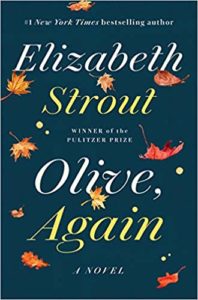Olive at Last
It’s a delight to have Olive back, a few years older and salty as ever. For readers who first became acquainted with this enigmatic character in Elizabeth Strout’s 2008 novel called Olive Kitteridge, catching up with her a decade later in Olive, Again is like meeting up with an old friend. Although Olive isn’t exactly like a friend; she’s too edgy for that. She is more like an old haunt. Something from the past that lingers, a presence you can’t forget completely because it doesn’t blend in with all the ordinary memories that gradually fade away.
A book is a perfect way to get to know a character like Olive, because you can put a book down. Dealing with a character like Olive in real life would be hard work. Let’s be honest; coping with Olive could be more work than it’s worth if you happen to be one of those people she decides she doesn’t like.
Having other characters share in Olive’s story is intricate work for an author. Olive creates confusion, and her cutting comments chip away to reveal others, like a sculptor’s chisel working in marble. Elizabeth Strout is brilliant at creating interesting secondary characters, who can stand up to and seem real alongside someone as complicated as Olive.
Readers like Olive. We become her fans as we are ushered past her curmudgeonly exterior to get a glimpse of the insecure and lonely person within. In the story Olive regularly embarrasses others, and vicariously she embarrasses us, her readers. We are granted literary distance, however, and that permits us to catch the image of ourselves briefly in her mirror and then move on.
 Elizabeth Strout, through the character of Olive Kitteridge, is a brilliant observer of the way we all are when we think no one is watching. Olive is an old woman who has difficulty with bowel control. In her own mind she refuses to use the euphemisms for discreet hygiene products. She calls them “poopie panties,” but she also admits to a friend that she goes to the store early in the morning when there are likely to be fewer customers there to see her purchasing them. Her foibles are out there for us to see, and along with the chuckle we release while observing them, we grow a fondness for Olive.
Elizabeth Strout, through the character of Olive Kitteridge, is a brilliant observer of the way we all are when we think no one is watching. Olive is an old woman who has difficulty with bowel control. In her own mind she refuses to use the euphemisms for discreet hygiene products. She calls them “poopie panties,” but she also admits to a friend that she goes to the store early in the morning when there are likely to be fewer customers there to see her purchasing them. Her foibles are out there for us to see, and along with the chuckle we release while observing them, we grow a fondness for Olive.
Olive does not suffer fools gladly. As we read we might wonder if she would suffer us gladly. Talking with a young woman about the death of her father, she reminds her that her father was never quite “right in the head.” Olive describes a respected citizen of her hometown as “an old bat,” and she does so without hesitation or apology. She makes comments about other people in a voice loud enough for them to hear. More important to Olive than being proper is being honest.
Not all of Olive, Again is about Olive. Some of it is about her hometown of Crosby, Maine. One full chapter is about characters from one of Elizabeth Strout’s other novels. The chapters hold together like a collection of short stories. They move around from one time frame to another. They pull up details from the past and plug them into new stories in the present. This is an interesting feature of Elizabeth Strout’s writing. She seems to create stories about characters who have a life of their own, and it is not limited to the book in which they are revealed.
Some of Elizabeth Strout’s stories are built around passing encounters between characters who are nearly strangers. Her ability to draw us close to those characters reveals a remarkable empathy for her characters, but an equally remarkable empathy for her readers. She knows how to get to us. Sometimes we are drawn into observing scenes that are attention-gettingly awkward or larded with humor. Our peering into them almost seems voyeuristic. We laugh at the awkwardness. We laugh at Olive’s eccentricity. The humor makes us drop our guard, and then it leaves us undefended when the tragedy sweeps in.
One remarkable story begins with Olive’s comments about a woman who once was a guidance counselor in the local high school but now is old and living in a “rest home.” Her husband died in a house fire when their large old home on the edge of town burned to the ground. Olive surmises that the widow in the rest home has “gone completely dopey-dope.” Sometimes Olive is the local gossip, and what she reports in the voice of cold cynicism rings merciless. But there is that other side of Olive. It emerges just as we might be judging her cold exterior. Olive knows tragedy when she sees it. She feels it somewhere deep and wordless. As she is driving past the burnt out house she comments, “Sad, sad, sad.”
From one episode to the next we see Olive’s own life shrinking. She is widowed twice. Her grandchildren outgrow her. Her only child lives at a distance. Her acquaintances die off. She moves into a facility where she can receive supportive care. One afternoon she attends a funeral for an acquaintance named Barbara.
She sat now in the early afternoon on one of the chairs set up in the meeting room for Barbara’s memorial service; she had put on a pair of poopie panties just in case…. About twenty people sat in a room that could hold three times that many. No one was weeping….
After the funeral Olive muses about her own life. She realizes that it is moving toward its end, and that all the things she has lived through and gathered into her memory will soon be gone. She goes to the typewriter on which she has been recording her memories and on a single sheet of paper she writes:
“I do not have a clue who I have been. Truthfully, I do not understand a thing.”
We can assume that the first sentence is Olive’s. It fits the narrative. But whose voice is heard in the second sentence? It is so like Elizabeth Strout to shape-shift voices. All we know is that Olive places the sheet of paper on the top of the stack of memories she has been writing. It closes a story about an old woman we feel we have gotten to know, and it is the end of Olive, Again.



